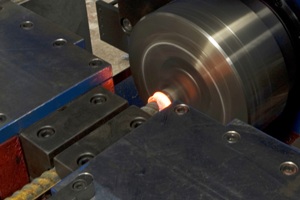Nov 25 2010
A new benchmark in the coupling of re-bars has been set by steel reinforcement specialist Hy-Ten with the UK's first ever friction welded coupler.
Fully approved by independent test laboratories, the HT Welded Coupler offers enhanced structural performance, significant site productivity gains with additional material cost savings.
 The HT Welded Coupler for re-bar is based on technology widely used in aerospace and automotive industries.
The HT Welded Coupler for re-bar is based on technology widely used in aerospace and automotive industries.
"In the past, to create a coupled joint, both bars have to be threaded - one end receiving a coupler in the factory, the other end being positioned and screwed-in on-site. Our system requires no threading. We friction weld the couplers to the re-bar in the factory so they are simply screwed together on site in one quick and efficient process. You don't even need a torque wrench." commented Hy-Ten director Richard Webster.
Hy-Ten has invested a substantial sum in researching, perfecting and setting up the new process. Using a dedicated machine, couplers are rotated at high speed. The re-bar is offered up to the coupler and the friction between the surfaces scours and heats the metal surfaces to fusing point.
Extensive trials by the Certification Authority for Reinforcing Steel (CARES) have proven the strength of the union after testing multiple samples to destruction. Ultimate failure was in the re-bar and not the joint, with forces as high as 630 Newton's being applied to break the bar.